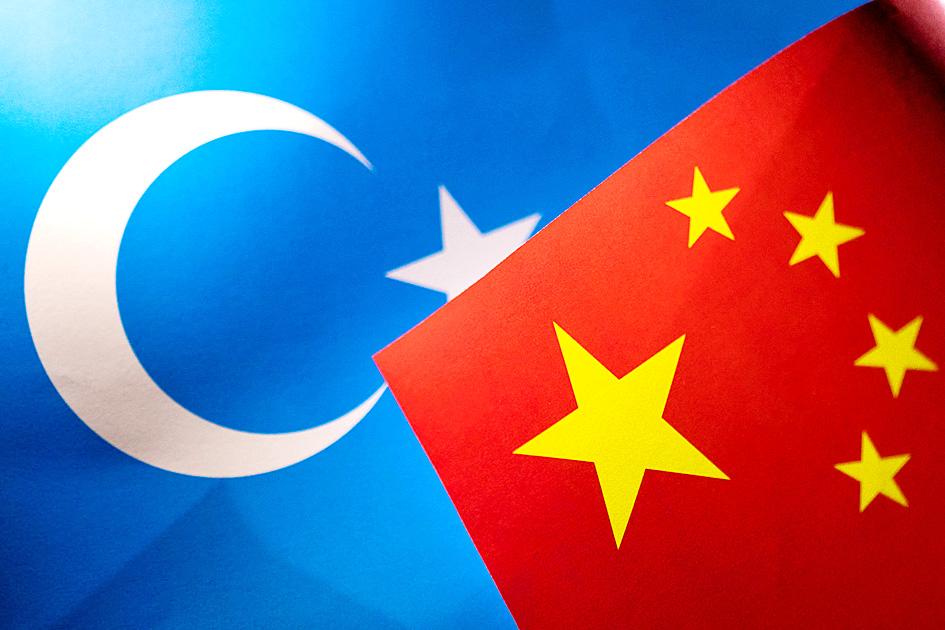The fashion industry has been told it must wean itself off cotton from China’s Xinjiang region, as a new law comes into force giving US border authorities greater powers to block or seize goods linked to forced labor in China.
The Uyghur Forced Labor Prevention Act (UFLPA), which came into force yesterday, assumes that any product partly or wholly made in Xinjiang is linked to the region’s labor camps.
Since 2017, the Chinese authorities have detained as many as 1 million Uighurs and subjected them to forced labor.

Photo: Reuters
The fashion industry would be particularly affected by the new law. About 20 percent of the world’s cotton comes from China and 84 percent of that comes from Xinjiang.
The UFLPA has designated cotton a “high priority for enforcement,” along with tomatoes and polysilicon. Any fashion brand exporting to the US would also be subject to it and failure to provide adequate certification or supply-chain details could result in fines of up to US$250,000.
However, the ban poses big problems for the industry.
Liv Simpliciano of Fashion Revolution said Xinjiang cotton is ubiquitous in supply chains.
“The difficulty is that at the ginning stage [when fibers are separated from their seeds], cotton from disparate locations is mixed together, making it impossible to trace the provenance,” she said.
A number of technology companies, among them TrusTrace, SupplyShift and TextileGenesis, plan to use blockchain and artificial intelligence to trace supply chains for fashion labels. Brands can use the platforms to log all their purchase orders and certifications.
To prove conclusively an absence of Xinjiang cotton, brands would need to show a “complete digital chain of custody, where a brand is fully in control of its supply chain from the farm onwards,” TrusTrace chief executive officer Shameek Ghosh said.
While fashion has historically been notoriously cagey about its supply chains, there is now a strong business case for full transparency.
A report by the financial think tank Planet Tracker said that implementing traceability “can improve net profit on average by 3 to 7 percent for apparel companies.”
That is before any fashion stock has been impounded by border forces.
Because of General Data Protection Regulation, TrusTrace is not alerted if Xinjiang cotton is found in a brand’s supply chain.
“Only the brand is informed,” Ghosh said. “They wouldn’t use a platform like this [if they’d be exposed].”
However, blockchain technology is not without its problems.
“If you’re relying on brand discretion to ratify their sourcing practices, then what’s the efficacy going to be?” Philippa Grogan of Eco-Age asked.
“Also, blockchain technology is not regulated, so it creates a risk environment — the lack of regulatory oversight makes it vulnerable to market manipulation,” she said.

US President Donald Trump yesterday announced sweeping "reciprocal tariffs" on US trading partners, including a 32 percent tax on goods from Taiwan that is set to take effect on Wednesday. At a Rose Garden event, Trump declared a 10 percent baseline tax on imports from all countries, with the White House saying it would take effect on Saturday. Countries with larger trade surpluses with the US would face higher duties beginning on Wednesday, including Taiwan (32 percent), China (34 percent), Japan (24 percent), South Korea (25 percent), Vietnam (46 percent) and Thailand (36 percent). Canada and Mexico, the two largest US trading

AIR SUPPORT: The Ministry of National Defense thanked the US for the delivery, adding that it was an indicator of the White House’s commitment to the Taiwan Relations Act Deputy Minister of National Defense Po Horng-huei (柏鴻輝) and Representative to the US Alexander Yui on Friday attended a delivery ceremony for the first of Taiwan’s long-awaited 66 F-16C/D Block 70 jets at a Lockheed Martin Corp factory in Greenville, South Carolina. “We are so proud to be the global home of the F-16 and to support Taiwan’s air defense capabilities,” US Representative William Timmons wrote on X, alongside a photograph of Taiwanese and US officials at the event. The F-16C/D Block 70 jets Taiwan ordered have the same capabilities as aircraft that had been upgraded to F-16Vs. The batch of Lockheed Martin

China's military today said it began joint army, navy and rocket force exercises around Taiwan to "serve as a stern warning and powerful deterrent against Taiwanese independence," calling President William Lai (賴清德) a "parasite." The exercises come after Lai called Beijing a "foreign hostile force" last month. More than 10 Chinese military ships approached close to Taiwan's 24 nautical mile (44.4km) contiguous zone this morning and Taiwan sent its own warships to respond, two senior Taiwanese officials said. Taiwan has not yet detected any live fire by the Chinese military so far, one of the officials said. The drills took place after US Secretary

THUGGISH BEHAVIOR: Encouraging people to report independence supporters is another intimidation tactic that threatens cross-strait peace, the state department said China setting up an online system for reporting “Taiwanese independence” advocates is an “irresponsible and reprehensible” act, a US government spokesperson said on Friday. “China’s call for private individuals to report on alleged ‘persecution or suppression’ by supposed ‘Taiwan independence henchmen and accomplices’ is irresponsible and reprehensible,” an unnamed US Department of State spokesperson told the Central News Agency in an e-mail. The move is part of Beijing’s “intimidation campaign” against Taiwan and its supporters, and is “threatening free speech around the world, destabilizing the Indo-Pacific region, and deliberately eroding the cross-strait status quo,” the spokesperson said. The Chinese Communist Party’s “threats